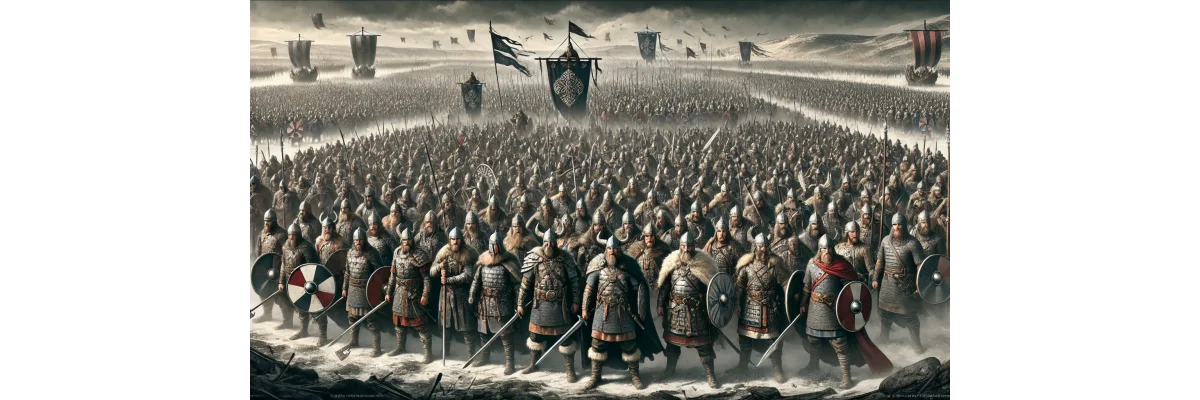The Battle of Brunanburh in 937 AD: A Turning Point in Anglo-Saxon History
The Battle of Brunanburh, fought in 937 AD, is considered one of the most pivotal battles in Anglo-Saxon history. It saw the coming together of various kingdoms of Britain, as King Æthelstan of the Anglo-Saxons faced a united force of Danes, Scots, and other allies. The outcome of this battle secured Æthelstan’s rule over England and marked a significant milestone in the consolidation of the kingdom. However, the Battle of Brunanburh is not only a significant military engagement, but also a symbol of the conflicts and challenges faced by medieval England.
The Background of the Battle
By 937, King Æthelstan of Wessex, who had ascended the throne in 924 after the death of his father, Edmund I, was the first king to attempt uniting all of Britain under one rule. Æthelstan had already secured control over the southern parts of England and parts of Wales, but the north, particularly the kingdom of Northumbria, was still contested.
During this time, the land was inhabited by various ethnic and political groups, including Anglo-Saxon kingdoms, the Danes (often referred to as "Vikings"), and the Scots. The Danes and their allies, led by Olaf Guthfrithson (King of Dublin), and the Scots under King Malcolm I, gathered to fight against Æthelstan and end his rule. It was a time when the Anglo-Saxon kingdom and the Danes were in constant competition for power and influence.
The Course of the Battle
The Battle of Brunanburh took place at a location now known as Brunanburh, though its exact site remains a subject of dispute. The decisive clash between Æthelstan’s forces and the united armies of the Danes and Scots is described as epic and brutal. Æthelstan led his army with the support of his brother Edmund and his half-brother Aelfweard, while the Danes and Scots fielded a numerically superior force.
The battle itself was marked by fierce fighting, with the different armies clashing in bloody combat. Æthelstan, known as a skilled and strategic ruler, relied on the discipline and cohesion of his troops to overcome the enemy’s superior numbers. Amidst the chaos and violence, he achieved a decisive victory.
The Battle of Brunanburh is significant because it definitively crushed the Danes’ attempt to control southern England. Æthelstan’s victory not only secured the Anglo-Saxon dominance but also laid the groundwork for a unified English monarchy.
The Aftermath of the Battle
Æthelstan’s victory at Brunanburh had far-reaching consequences for the history of England. He not only secured control over Northumbria, but also parts of Scotland and Wales. This led to the first real unification of England under a single king, and Æthelstan was recognized as the first “King of all Britain.”
The victory also weakened the Danish hold over Britain. Though Denmark and Norway continued to be a threat to the kingdom of England, Æthelstan’s triumph was a symbol of the strength and independence of the Anglo-Saxon monarchy. The Danes lost their chance to expand further into southern England and were forced to focus on their northern territories.
Another important aspect of the Battle of Brunanburh was its symbolic significance. Æthelstan’s victory showed that the Anglo-Saxon kingdoms were capable of standing firm against the Viking influences and creating a united nation. This strengthened political stability in England and laid the foundation for the later political developments that eventually led to the formation of the medieval English state.
Remembering the Battle of Brunanburh
Although the Battle of Brunanburh represented a decisive turning point in the history of England, it has not been as celebrated as other historical battles like the Battle of Hastings in 1066. Nonetheless, it remains a significant event in Anglo-Saxon history and is often referenced in both the English and Nordic sagas as a symbol of Æthelstan’s leadership and strategic prowess.
The memory of the Battle of Brunanburh lives on in the annals of Anglo-Saxon history, and it continues to symbolize the resistance against foreign powers and the success of a united English kingdom.
Conclusion: The Battle of Brunanburh as a Milestone
The Battle of Brunanburh was a crucial moment in English history. It marked the victory of a united kingdom under Æthelstan, the first King of all Britain, and the final defeat of the Danish invaders. The battle is a symbol of the strength and resistance of the Anglo-Saxons and represents a key milestone in the formation of modern England. Today, it is celebrated as one of the most significant military events of the Anglo-Saxon era and stands as a reminder of Æthelstan’s important role in British history.

 German
German














